
The English Renaissance theatre or Elizabethan theatre was the theatre of England from 1558 to 1642. Its most prominent playwrights were William Shakespeare, Christopher Marlowe and Ben Jonson.

Anne Hathaway's Cottage is a twelve-roomed farmhouse where Anne Hathaway, the wife of William Shakespeare, lived as a child in the village of Shottery, Warwickshire, England, about 1 mile (1.6 km) west of Stratford-upon-Avon. Spacious, and with several bedrooms, it is now set in extensive gardens.
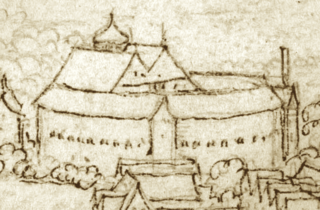
The Globe Theatre was a theatre in London associated with William Shakespeare. It was built in 1599 at Southwark, close to the south bank of the Thames, by Shakespeare's playing company, the Lord Chamberlain's Men. It was destroyed by fire on 29 June 1613. A second Globe Theatre was built on the same site by June 1614 and stayed open until the London theatre closures of 1642. As well as plays by Shakespeare, early works by Ben Jonson, Thomas Dekker and John Fletcher were first performed here.

The Folger Shakespeare Library is an independent research library on Capitol Hill in Washington, D.C., United States. It has the world's largest collection of the printed works of William Shakespeare, and is a primary repository for rare materials from the early modern period (1500–1750) in Britain and Europe. The library was established by Henry Clay Folger in association with his wife, Emily Jordan Folger. It opened in 1932, two years after his death.

The Theatre was an Elizabethan playhouse in Shoreditch, just outside the City of London. Built in 1576, after the Red Lion, it was the first permanent theatre built exclusively for the showing of theatrical productions in England, and its first successful one. Actor-manager James Burbage built it near the family home in Holywell Street. The Theatre's history includes a number of important acting troupes including the Lord Chamberlain's Men, which employed Shakespeare as actor and playwright. After a dispute with the landlord, the theatre was dismantled and the timbers used in the construction of the Globe Theatre on Bankside.
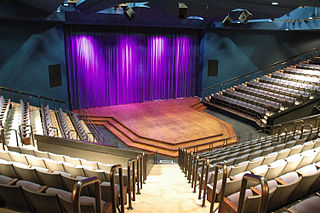
In theatre, a thrust stage is one that extends into the audience on three sides and is connected to the backstage area by its upstage end. A thrust has the benefit of greater intimacy between performers and the audience than a proscenium, while retaining the utility of a backstage area. This is in contrast to a theatre in the round, which is exposed on all sides to the audience, is without a backstage, and relies entirely on entrances in the auditorium or from under the stage. Entrances onto a thrust are most readily made from backstage, although some theatres provide for performers to enter through the audience using vomitory entrances. As with an arena, the audience in a thrust stage theatre may view the stage from three or more sides. Because the audience can view the performance from a variety of perspectives, it is usual for the blocking, props and scenery to receive thorough consideration to ensure that no perspective is blocked from view. A high-backed chair, for instance, when placed stage right, could create a blind spot in the stage left action.
James Burbage was an English actor, theatre impresario, joiner, and theatre builder in the English Renaissance theatre. He built The Theatre, the first permanent dedicated theatre built in England since Roman times.

The Curtain Theatre was an Elizabethan playhouse located in Hewett Street, Shoreditch, just outside the City of London. It opened in 1577, and continued staging plays until 1624.

The Oregon Shakespeare Festival (OSF) is a regional repertory theatre in Ashland, Oregon, United States, founded in 1935 by Angus L. Bowmer. The Festival now offers matinee and evening performances of a wide range of classic and contemporary plays not limited to Shakespeare. During the Festival, between five and eleven plays are offered in daily rotation six days a week in its three theatres. It welcomed its millionth visitor in 1971, its 10-millionth in 2001, and its 20-millionth visitor in 2015.
The Globe Theatre was a theatre in London associated with William Shakespeare.

Shakespeare's Globe is a reconstruction of the Globe Theatre, an Elizabethan playhouse first built in 1599 for which William Shakespeare wrote his plays. Like the original, it is located on the south bank of the River Thames, in Southwark, London. The reconstruction was completed in 1997 and while concentrating on Shakespeare's work also hosts a variety of other theatrical productions. Part of the Globe's complex also hosts the Sam Wanamaker Playhouse for smaller, indoor productions, in a setting which also recalls the period.
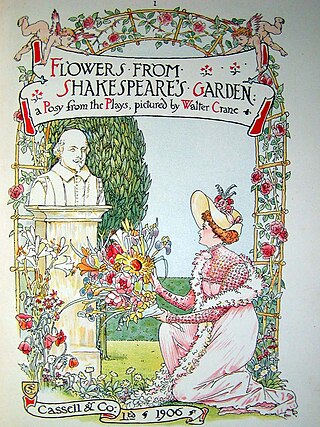
A Shakespeare garden is a themed garden that cultivates some or all of the 175 plants mentioned in the works of William Shakespeare. In English-speaking countries, particularly the United States, these are often public gardens associated with parks, universities, and Shakespeare festivals. Shakespeare gardens are sites of cultural, educational, and romantic interest and can be locations for outdoor weddings.

Thousands of performances of William Shakespeare's plays have been staged since the end of the 16th century. While Shakespeare was alive, many of his greatest plays were performed by the Lord Chamberlain's Men and King's Men acting companies at the Globe and Blackfriars Theatres. Among the actors of these original performances were Richard Burbage, Richard Cowley, and William Kempe.
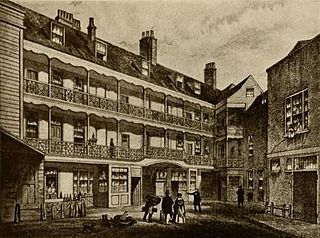
In the historical era of English Renaissance drama, an Inn-yard theatre or Inn-theatre was a common inn with an inner courtyard with balconies that provided a venue for the presentation of stage plays.

The Gdańsk Shakespeare Theatre is a Shakespearean theatre in Gdańsk, Poland. It is built on the site of a 17th-century theatre, known as the Fencing School, where English travelling players performed works of English Renaissance theatre. The leading figure in the project to construct the new theatre is Jerzy Limon, a founder of the Gdańsk Shakespeare Festival.
Shakespeare Festival Neuss is an annual theatre festival in Neuss, Germany. It has taken place in a replica of the Globe Theatre on the grounds of the Neuss racecourse since 1991.
A Shakespeare festival is a theatre organization that stages the works of William Shakespeare continually.
The New Swan Theater is an outdoor, portable theater that is assembled and disassembled each summer as part of New Swan Shakespeare Festival, the annual Shakespeare festival at the University of California, Irvine. It is a reduced-size replica of Shakespeare's Globe Theatre.
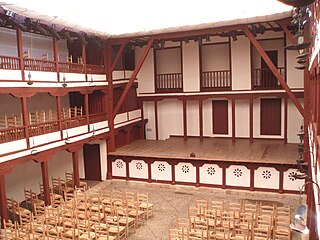
Corral de comedias is a type of open-air theatre specific to Spain. In Spanish all secular plays were called comedias, which embraced three genres: tragedy, drama, and comedy itself. During the Spanish Golden Age, corrals became popular sites for theatrical presentations in the early 16th century when the theatre took on a special importance in the country. The performance was held in the afternoon and lasted two to three hours, there being no intermission, and few breaks. The entertainment was continuous, including complete shows with parts sung and danced. All spectators were placed according to their sex and social status.

The Allen Elizabethan Theatre has evolved since the founding of the Oregon Shakespeare Festival when the first performance of Twelfth Night was presented on July 2, 1935.
















